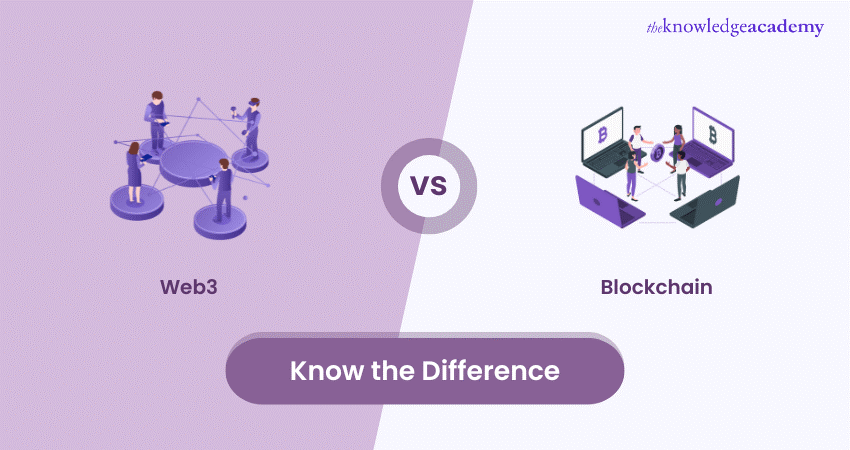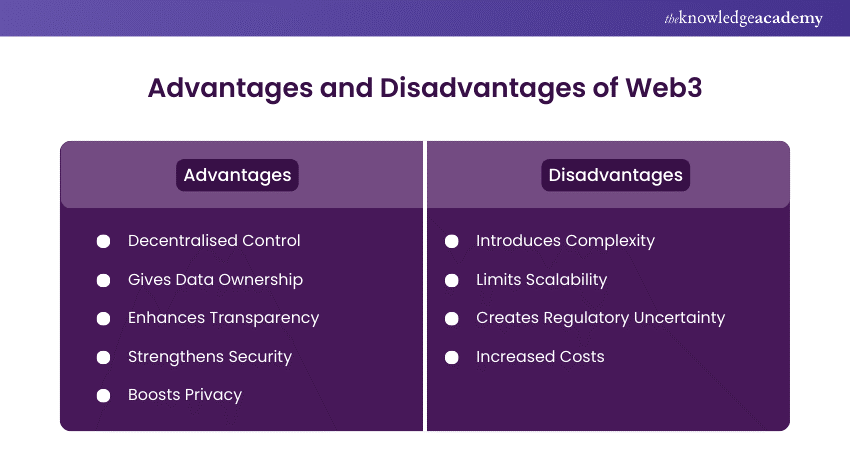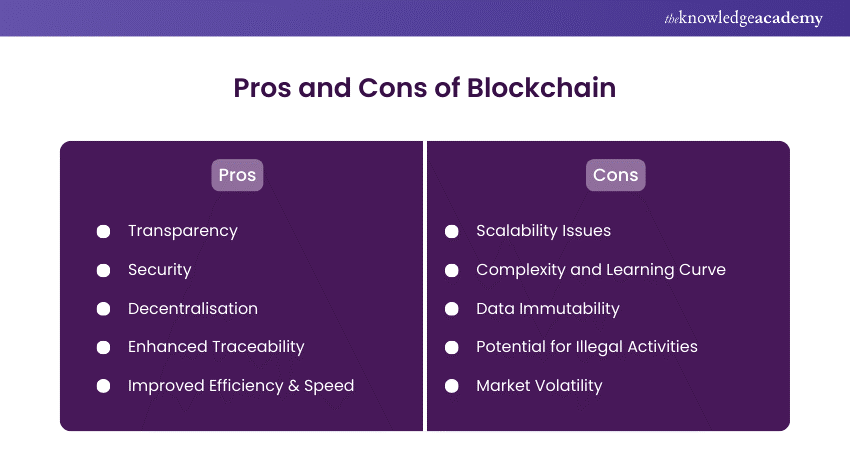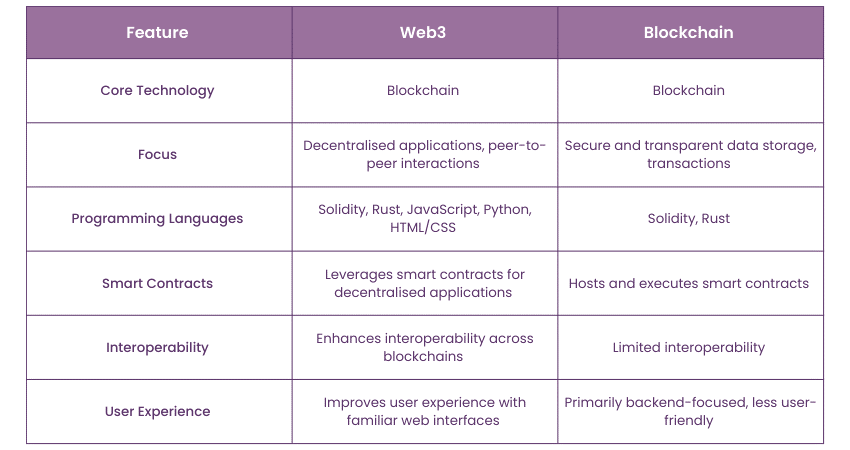We may not have the course you’re looking for. If you enquire or give us a call on 01344203999 and speak to our training experts, we may still be able to help with your training requirements.
We ensure quality, budget-alignment, and timely delivery by our expert instructors.

In today’s fast-evolving digital world, making the right choice for your business is more critical than ever. Should you embrace the cutting-edge possibilities of Web3 or leverage the solid foundations of blockchain? This blog breaks down the mystery of Web3 vs Blockchain, guiding you toward the path that best aligns with your business goals and future growth.
Table of Contents
1) What is Web3?
2) What is Blockchain?
3) Differences Between Web3 and Blockchain
4) Future of Blockchain and Web3
5) Conclusion
What is Web3?
Web3 is the evolution of the internet that focuses on decentralisation, user ownership, and digital freedom. Unlike Web2, where centralised platforms dominate, Web3 leverages blockchain technology to create peer-to-peer networks. Reading a Web3 book can help you understand This shift gives users more control over their data, direct interactions, and ownership of digital assets, creating a more secure, transparent, and user-centric online experience, while also offering the opportunity to Become a Web3 Developer and shape the future of the internet.

Advantages of Web3
Web3 transforms online interactions by prioritising user control, privacy, and transparency. The advantages of Web3 include:
a) Decentralised Control: Empowers users by reducing reliance on central authorities.
b) Gives Data Ownership: Users fully own and control their data.
c) Enhances Transparency: Makes transactions and interactions visible and verifiable.
d) Strengthens Security: Uses blockchain for better protection.
e) Boosts Privacy: Limits data exposure compared to traditional platforms.
Disadvantages of Web3
While Web3 brings many benefits, it also poses challenges that can hinder its adoption. The Web3 Disadvantages include:
a) Introduces Complexity: new users often struggle to understand Web3 concepts.
b) Limits Scalability: Blockchain networks operate slower and less efficiently than traditional systems.
c) Creates Regulatory Uncertainty: Decentralisation complicates regulation and compliance.
d) Increased Costs: Blockchain transactions can be expensive due to fees.
What is Blockchain?
Blockchain decentralises digital ledgers, securely recording transactions across a network of computers. It organises data into chronologically linked blocks, forming an immutable chain that ensures transparency and security. By eliminating intermediaries, blockchain powers cryptocurrencies, smart contracts, and decentralised applications, creating a more efficient and trustworthy system for digital interactions.

Advantages of Blockchain
Blockchain Technology delivers several benefits that enhance the efficiency and security of digital systems. The advantages of blockchain include:
a) Transparency: Blockchain’s decentralised nature ensures that all participants in the network have access to the same data. This transparency builds trust among users, as all transactions are visible and traceable, reducing the likelihood of fraud or manipulation.
b) Security: Blockchain employs advanced cryptographic techniques to secure data. Each transaction is linked to the previous one, forming an immutable chain. Once data is recorded on the blockchain, it cannot be altered or deleted, making it highly resistant to hacking and other cyber threats.
c) Decentralisation: Unlike traditional centralised systems, blockchain operates on a distributed network of nodes. This decentralisation eliminates the need for a central authority, reducing the risk of a single point of failure and increasing the system’s robustness.
d) Enhanced Traceability: Blockchain provides a permanent, auditable record of transactions, which is particularly valuable in supply chain management. Companies can trace the origin of products, verify authenticity, and ensure compliance with regulations, thereby improving accountability.
e) Improved Efficiency and Speed: Traditional paper-heavy processes can be streamlined using blockchain, reducing the time required for transactions and increasing overall efficiency. Smart contracts, self-executing contracts with the terms of the agreement directly written into code, further automate processes, reducing the need for manual intervention.
Disadvantages of Blockchain
Despite its benefits, blockchain technology presents challenges that hinder its widespread adoption. The disadvantages of blockchain include:
a) Scalability Issues: Blockchain networks, especially those like Bitcoin and Ethereum, can suffer from scalability problems. As more transactions are processed, the network can become congested, leading to slower transaction times and higher fees. Scaling solutions are still in development, but they are not yet universally implemented.
b) Complexity and Learning Curve: Blockchain technology is complex and requires a significant amount of knowledge to understand and implement effectively. For businesses and individuals unfamiliar with the technology, the learning curve can be steep, which may hinder widespread adoption.
c) Data Immutability: While immutability is often touted as an advantage, it can also be a disadvantage. Once data is recorded on the blockchain, it cannot be altered. This means that errors or fraudulent transactions cannot be corrected, which can be problematic in certain situations.
d) Potential for Illegal Activities: The pseudonymous nature of many blockchain networks can be exploited for illegal activities, such as money laundering, tax evasion, and the purchase of illegal goods and services. While blockchain can enhance privacy, it can also make it difficult for authorities to track illicit activities.
e) Market Volatility: In the case of cryptocurrencies, which are often based on blockchain technology, market volatility can be a significant risk. Prices can fluctuate wildly, leading to uncertainty and potential financial loss for investors and businesses that accept cryptocurrencies as payment.
Craft responsive websites with ease—boost your career with Front-End Web Development Course!
Difference Between Web3 and Blockchain
Web3 and blockchain are closely related but play distinct roles in the decentralised ecosystem. Understanding their differences clarifies how they contribute to the future of digital interactions. Here’s how they differ across key aspects:

Unlock your potential in app development with React Native Training—start today!
Future of Blockchain and Web3
The future of blockchain and Web3 envisions a more decentralised, secure, and user-driven digital landscape. Blockchain technology will evolve beyond cryptocurrencies, driving innovation across the supply chain management, healthcare, and finance industries. Its ability to deliver transparency, security, and trustless operations will pave the way for broader adoption in both the public and private sectors.
Web3 will reshape the internet by empowering users with greater control over their data and digital identities, reducing reliance on big tech companies. Decentralised applications (dApps) will become more user-friendly and widespread, redefining digital interaction, ownership, and collaboration.
Moreover, as blockchain and Web3 continue to develop, overcoming challenges like scalability and interoperability will be key. Layer-2 scaling solutions and cross-chain bridges will enhance efficiency and connectivity across platforms. Additionally, evolving regulatory frameworks will significantly influence how these technologies integrate into mainstream use.
Design interactive websites with our JavaScript and jQuery Training—begin now!
Conclusion
Understanding the differences between Web3 vs Blockchain helps you make informed decisions in the evolving digital landscape. Choose Web3 if you prioritise decentralisation and user empowerment, or opt for blockchain for secure, transparent transactions and efficient data management. Both technologies transform digital experiences—your decision will shape your business growth and drive future innovation.
Transform your front-end skills with our Angular Training- sign up today!
Frequently Asked Questions
How do Web3 and Blockchain Synergise?

Web3 leverages blockchain as its core infrastructure to enable decentralised apps (dApps) and peer-to-peer interactions. Blockchain provides security and transparency, while Web3 enhances user experience by allowing direct, trustless exchanges and ownership across decentralised platforms.
What are the Potential Challenges for Web3 and Blockchain?

Web3 and blockchain face challenges like scaling effectively, navigating regulatory uncertainty, and managing high energy demands. Web3 struggles with user adoption complexity, while blockchain encounters difficulties integrating with existing systems. These obstacles hinder their widespread growth and adoption.
What are the Other Resources and Offers Provided by The Knowledge Academy?

The Knowledge Academy takes global learning to new heights, offering over 3,000 online courses across 490+ locations in 190+ countries. This expansive reach ensures accessibility and convenience for learners worldwide.
Alongside our diverse Online Course Catalogue, encompassing 19 major categories, we go the extra mile by providing a plethora of free educational Online Resources like News updates, Blogs, videos, webinars, and interview questions. Tailoring learning experiences further, professionals can maximise value with customisable Course Bundles of TKA.
What is The Knowledge Pass, and How Does it Work?

The Knowledge Academy’s Knowledge Pass, a prepaid voucher, adds another layer of flexibility, allowing course bookings over a 12-month period. Join us on a journey where education knows no bounds.
What are the Related Courses and Blogs Provided by The Knowledge Academy?

The Knowledge Academy offers various App & Web Development Training, including the Front-End Web Development Course, and the React Native Training. These courses cater to different skill levels, providing comprehensive insights into a complete overview of Blockchain Developer Job Description.
Our Advanced Technology Blogs cover a range of topics related to Emerging Technologies and innovations, offering valuable resources, best practices, and industry insights. Whether you are a beginner or looking to advance your Tech Skills, The Knowledge Academy's diverse courses and informative blogs have got you covered.
Upcoming Programming & DevOps Resources Batches & Dates
Date
 Web3 Professional Certification Training Course
Web3 Professional Certification Training Course
Fri 6th Jun 2025
Fri 8th Aug 2025
Fri 3rd Oct 2025
Fri 5th Dec 2025






 Top Rated Course
Top Rated Course



 If you wish to make any changes to your course, please
If you wish to make any changes to your course, please


